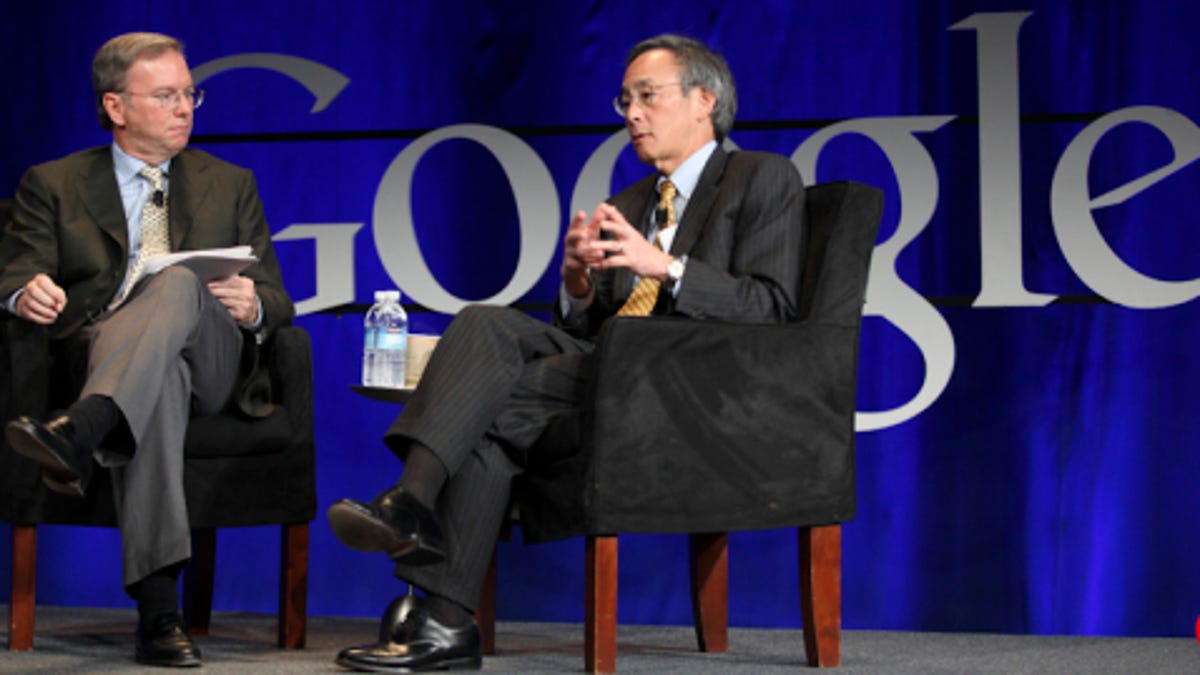Google's warm reception for secretary of energy
Steven Chu finds himself among friends in Mountain View, emphasizing that the U.S. government is very focused on science and engineering when it comes to energy policy.

MOUNTAIN VIEW, Calif.--For a bunch of search engineers, Google employees care an awful lot about energy and the environment.
Google hosted an event for employees Monday featuring Steven Chu, the U.S. secretary of energy under President Obama and a man Chief Executive Eric Schmidt said "may become one of the most influential scientists of our generation, if he isn't already." Chu took about an hour to speak to a packed room of Google employees following his announcement of $151 million in funding for new energy-related projects as part of the ARPA-E program.
Chu found a friendly audience of some of the most science-and-technology-obsessed individuals in a region known for science and technology obsession. He called the need to invest in alternative fuels and energy systems "the engineering and science challenge of our time" that will demand contributions from young scientists and technologists like the ones in Mountain View.
Several employees asked Chu to opine on the viability of various alternatives to fossil fuels, such as nuclear and geothermal, and the need to reduce carbon through a cap-and-trade system and carbon sequestration. Here Chu jostled a bit with Schmidt, who said he is skeptical about cap-and-trade systems and the ability of the nuclear industry to solve thorny problems like waste disposal and safety.
Congress is considering cap-and-trade legislation at the moment, and Chu is scheduled to testify before Congress on Tuesday about the need for such legislation. Schmidt isn't sure a global system can work because of the tendency for "rogue nations" to do as they please, but Chu thinks if carbon measurement systems are improved, hard data will make it easier to encourage those who are overproducing carbon to get their act together.
And on nuclear, Schmidt bemoaned the lack of standards in nuclear plant construction, saying "the human factors are a disaster" with every plant a little different than its counterparts and the waste issue still unsolved. Chu didn't debate the point, but said the nuclear industry is moving more toward solving those problems and improving safety.
Those were minor policy disagreements, however: Google and the current Department of Energy are definitely friends. Schmidt called Chu one of his heroes, and Chu praised Google's work on reducing the energy consumption of its servers and assuming a "leadership position" in reducing the carbon footprint of its operation.
Schmidt, who serves as an adviser to the administration on President Obama's Council of Advisers on Science and Technology, asked Chu what it's like being the senior scientist in the government. He's actually the first scientist to hold the secretary of energy position, and won the Nobel Prize in Physics in 1997.
"It's funny in a macabre sort of way. I don't think Congress treats me like your average cabinet member," Chu said with a wry chuckle. He said he's spent much of his first year on the job talking to Congress about the problems with energy use and the environment, and that legislators are receptive, for the most part.
"I think the president has made it very clear that science plays such an integral role in the decisions we have to make," Chu said. He was preaching to the choir at the Googleplex.